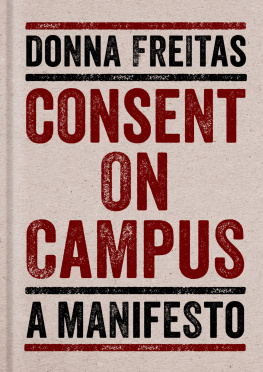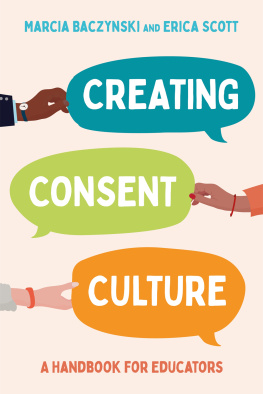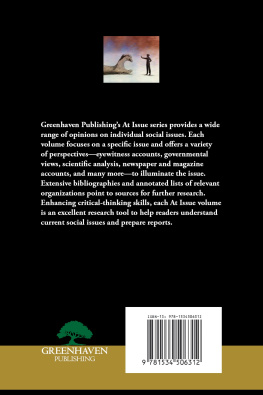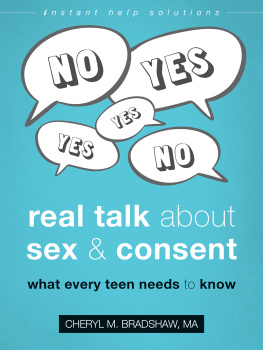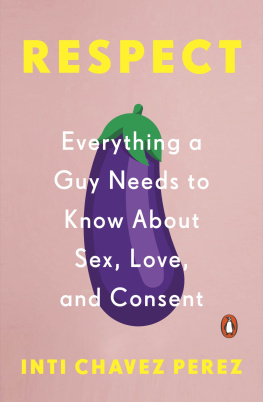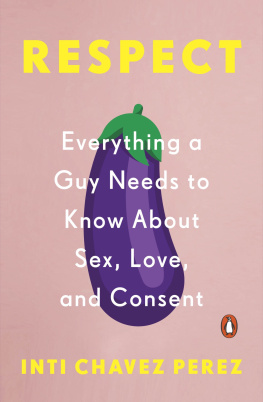CONSENT ON CAMPUS

Oxford University Press is a department of the University of Oxford. It furthers the Universitys objective of excellence in research, scholarship, and education by publishing worldwide. Oxford is a registered trade mark of Oxford University Press in the UK and certain other countries.
Published in the United States of America by Oxford University Press
198 Madison Avenue, New York, NY 10016, United States of America.
Donna Freitas 2018
All rights reserved. No part of this publication may be reproduced, stored in a retrieval system, or transmitted, in any form or by any means, without the prior permission in writing of Oxford University Press, or as expressly permitted by law, by license, or under terms agreed with the appropriate reproduction rights organization. Inquiries concerning reproduction outside the scope of the above should be sent to the Rights Department, Oxford University Press, at the address above.
You must not circulate this work in any other form and you must impose this same condition on any acquirer.
Library of Congress Cataloging-in-Publication Data
Names: Freitas, Donna, author.
Title: Consent on campus: a manifesto / Donna Freitas.
Description: New York, NY : Oxford University Press, [2018] | Includes index.
Identifiers: LCCN 2018001913 (print) | LCCN 2018021393 (ebook) |
ISBN 9780190671167 (updf) | ISBN 9780190671174 (epub) |
ISBN 9780190671150 (hardcover)
Subjects: LCSH: Rape in universities and collegesUnited StatesPrevention. |
College studentsSexual behaviorUnited States. | Sexual consentUnited States. |
Sexual ethicsUnited States.
Classification: LCC LB2345.3.R37 (ebook) | LCC LB2345.3.R37 F74 2018 (print) |
DDC 371.7/82dc23
LC record available at https://lccn.loc.gov/2018001913
CONTENTS
DEAR ALL UNIVERSITY PRESIDENTS...
When I first thought about writing this book, a manifesto really, about the crisis of sexual assault on campus, someone asked me who the audience would be. I answered, only slightly joking:
Everyone.
Pressed for a more specific response, I blurted out:
Every single college president in the United States.
When these words came out of my mouth, so forcefully and passionately, I was surprised. Until that moment I hadnt quite realized that, yes, I wanted every college president in America to read this book. Felt that they needed to read this book.
I wanted to reach the faculty, toothat Id already known to my core. The faculty are some of the most important and influential people on campus and in many ways are the people best positioned to address the issues at hand. And I wanted to reach the students, of course, because they are at the heart of this crisis. And the Student Affairs people, because they are my people, too; I worked in Residence Life for six years when I was a graduate student. But perhaps the most important audience for this book, however audacious it might sound, is university presidents.
I will tell you why.
Ive spent the last decade lecturing all over the United States about my research on sex and hookup culture on campus. The campuses where the president shows up for these conversationsor any conversation with students about anything to do with sex and relationshipshave completely different climates than other campuses. The faculty, toodont get me wrongare tremendously important to the climate, but there is just something about the president of the college taking the time to show that she or he cares that makes an enormous difference. It empowers everyone to take up the conversation and with gusto.
Ill give you an exampleone of the most memorable of the 150 or so lectures Ive given about sex on all types of campuses. A Catholic liberal arts college not far from Chicago invited me to give the annual lecture that the college president hosts each year in March. Prior to my visit, the president met with a faculty and staff reading group on a regular basis to discuss my book Sex and the Soul. When I arrived on campus, the president hosted a dinner with the reading group and some faculty and staff to welcome me. At one point during the dinner, he smiled, chuckled a bit, and told me:
You know, theres a rumor going around among the students that Im very angry youre here.
Waitwhat? I asked, confused by what he meant, since he was obviously not angry and was about as welcoming and jovial as anyone Ive met during a campus visit.
This president is also a member of a Catholic order of brothers, which is an essential piece of this story.
Well, he went on to explain, the students think I am against all talk of sex, so they believe that youre here against my wishes. At this point everyone else at the table, the faculty and staff, chuckled along with him.
In that moment, I realized how important it was that the studentsand everyone else on campus who might have doubtsknow that I was at this university to lecture at the presidents invitation.
On the afternoon of my talk, the hall was packed with hundreds of people, mostly students, but many faculty and staff as well. Everyone was mixed in togetherall these different members of the community sitting with each other in an effort to think and reflect about sex on campus. Somewhere around the third or fourth row was the president, wearing that same welcoming smile hed had on his face during dinner. As I stood at the front of the lecture hall, I wondered whether the students even realized he was there. The first thing I did as I welcomed everyone was to point out who was in attendance. I asked students to raise their hands first, then student staff (the resident assistants), then professional staff (Student Affairs and Campus Ministry). Then I asked all the faculty in the room to stand upand there were many, perhaps the most Ive ever had at one of my lectures. I wanted the students to see, to notice, every single member of the faculty in the room, so they would also know that the faculty are people who are willing to come to the table to talk with them about sex on campusthat these faculty were open and willing conversation partners. But the last thing I did was mention the rumors Id been told regarding the president, and I explained that he was, in fact, sitting there in the audience. Then I asked him to stand up and wave at the large crowdwhich he did.
A ripple of whispers moved through the audience.
The students were fairly stunned to see him, I think. In a good way.
His presence mattered a great deal to them. It let new air into the room and allowed people to breathe, to sigh with relief, as they realized the following: The president is here at the table with us for this discussion. The president cares. The president is open. The president wants us to think about this. The president wants to think about this with uswith all of us. He is one among many possible conversation partners in our community, and his presence empowers the rest of us, gives us permission to think about this issue critically and honestly.
Showing up for an hour-long lecture may seem like such a small thing, so insignificant and not even that taxingthe president walked into the hall and sat down in a chair where the students could see him. How much, really, does that cost a president? Nearly nothing. But the impact of this act on the students was tremendous. The same goes for the presence of so many faculty. Just by being there, they told the students that thinking and talking about sex in its many and complicated dimensions was both intellectually worthy and institutionally worthy. It was something they were going to talk about and think about on this campus, and everyone would be involved, both inside the classroom and out.

